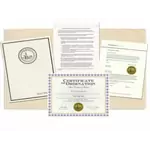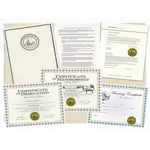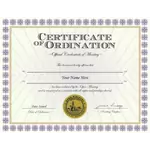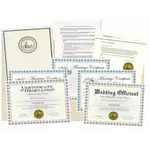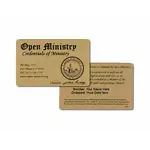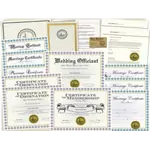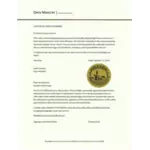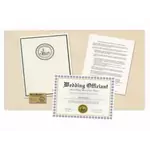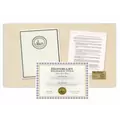State Marriage Laws and Information
Since 2010, Open Ministry has been ordaining and helping people all over the world perform weddings, ceremony and other sacerdotal duties. This page focuses on requirements and information for Vermont; Scroll down to the bottom of the page for links to other states.
How to get ordained and perform a wedding in Vermont
If you are planning to get ordained in Vermont or you have been asked to perform a wedding ceremony in Vermont, or simply need to to find an ordained minister in Vermont to perform your wedding ceremony.
This ordination information forVermont is provided below in an easy five step layout which is designed help walk you through the most common steps on registering to become a minister for Vermont and how perform a wedding ceremony in Vermont.
Step 1 - Get Ordained Online for free with Open Ministry
Step 1: Get Ordained in Vermont with Open Ministry
Receive your clerical ordination in Vermont through Open Ministry-100% free and fully online, with your digital ordination confirmation delivered instantly and printed proofs offered at our bookstore.
When you get ordained in Vermont through Open Ministry, you’ll enjoy:
- Digital ordination - confirmed via email free of charge.
- Optional printed certificates - available in our store.
- Universal recognition - valid across Vermont.
- Unlimited officiant scope - weddings, elopements, vow renewals.
- Community vetted - join ministers since 2010.
How It Works
- Click Get Ordained in Vermont.
- Provide your details on our encrypted form.
- Check your inbox for your free digital ordination; then order printed certificates.
With Open Ministry’s ordination, you become an officially empowered minister in Vermont, able to officiate legal wedding ceremonies statewide.
Our process is free and fast-printed certificates available for a small reasonable fee.
Step 2 - Contact The County Clerk
How to Register to Officiate a Marriage in Vermont
Next, contact the office of your local marriage authority (typically your county clerk in Vermont). Let them know that you are a ordained minister with Open Ministry in California, and ask them what information the will require of you, to officiate a marriage in Vermont. Most clerks and governing agencies may require that you present them with a physical copy of your ordination record.
When speaking with the county clerk; it can be helpful to use the following phrases.
- What agency or department issues marriage licenses in your county and how may I contact them?
- I am an ordained minister with a church in California and I would like to register as a wedding Officiant in your county to perform and solemnize weddings.
- I have my Letter of Good Standing and/or Ordination Credential as proof of my ministry and ordination.
- What additional documentation is required for me to register as a wedding Officiant in your county or state?
Step 3 - Get registered to perform a Marriage
License to perform a wedding in Vermont
After you've contacted your marriage authority, you will want to visit our bookstore to get physical copies official credentials for presentation and your records. (See Vermont State Statutes for More Specific Requirements )
When registering in Vermont you may be asked to display proof of your ordination to the county clerk's before they will accept the marriage license as having been legally solemnized. We typically advise ministers of Vermont to get a Complete Minister Package for Vermont which includes your Letter of Good Standing (the live signed and notarized physical copy of your standing with our ministry).
Having your physical copies credentials provides peace-of-mind to couples and others that you intend to marry. Additionally, we recommend at least 4 weeks between the date of the wedding ceremony and your order, to ensure that you receive all of your materials and are able to register in time. Please note that every state and county can impose different requirements. This may include other nominal fees and additional paperwork that may need to be completed before the ceremony can take place.
It is important to note that some county clerks in Vermont may require wedding officiants to attach a statement which asserts some of the elements in the marriage license upon submission, including the following:
- The time and location at which the wedding took place
- The names and places of residence of all official witnesses
- The religious organization in which the officiant is ordained
- The printed name and address of the officiant
Please note that, when filling out a marriage license, that Vermont State may request you use the title "Minister" or "Reverend". The County Clerks may also require you enter your denomination, you can use "Non-Denominational". Failing to state a denomination may result in rejection and could require a duplicate marriage license.
Step 4 - How to Perform the Wedding
How to perform a wedding in Vermont
Once you have completed of the above, you are ready to perform the wedding! Be sure that the couple has picked up their Vermont state issued marriage license from the appropriate office. Vermont marriage licenses valid for a set number of days, and there may be a waiting period between when the couple receives the marriage license in Vermont and when the ceremony may be legally performed in Vermont. This information should be written on the license and followed to ensure the ceremony is recorded properly.
Please be aware that the signed license must be returned to the issuing office in Vermont before the time limit is reached. Check the marriage license for the exact dates. Once the the previous matters have been addressed, officiating a wedding in Vermont can be a great and wonderful experience.
If you have any comments or issues as a wedding officiant in Vermont, or after you have been ordained, or would like to just asking for guidance on how to perform a wedding ceremony in Vermont. We recommend that all new Vermont wedding ministers who have issues or concerns about the ceremony read over our helpful guides.
Vermont
5144 Persons Authorized to Solemnize Marriages
(a) Marriages may be solemnized by a supreme court justice, a superior judge, a judge of probate, an assistant judge, a justice of the peace, a magistrate, an individual who has registered as an officiant with the Vermont secretary of state pursuant to section 5144a of this title, a member of the clergy residing in this state and ordained or licensed, or otherwise regularly authorized thereunto by the published laws or discipline of the general conference, convention, or other authority of his or her faith or denomination, or by such a clergy person residing in an adjoining state or country, whose parish, church, temple, mosque, or other religious organization lies wholly or in part in this state, or by a member of the clergy residing in some other state of the United States or in the Dominion of Canada, provided he or she has first secured from the probate division of the superior court in the unit within which the marriage is to be solemnized a special authorization, authorizing him or her to certify the marriage if the probate judge determines that the circumstances make the special authorization desirable. Marriage among the Friends or Quakers, the Christadelphian Ecclesia, and the Baha'i Faith may be solemnized in the manner heretofore used in such societies.
(b) This section does not require a member of the clergy authorized to solemnize a marriage as set forth in subsection (a) of this section, nor societies of Friends or Quakers, the Christadelphian Ecclesia, or the Baha'i Faith to solemnize any marriage, and any refusal to do so shall not create any civil claim or cause of action.
Title 18: Health - Part 6: Births, Marriages and Deaths - Chapter 105: Marriage Records and Licenses
Amended 1965, No. 194, § 10, eff. Feb. 1, 1967; 1971, No. 22, eff. March 23, 1971; 1975, No. 1; 1979, No. 142 (Adj. Sess.), § 26; 1981, No. 113 (Adj. Sess.); 1999, No. 91 (Adj. Sess.), § 28; 2007, No. 148 (Adj. Sess.), § 1; 2009, No. 3, § 9, eff. Sept. 1, 2009; 2009, No. 154 (Adj. Sess.), § 147.

